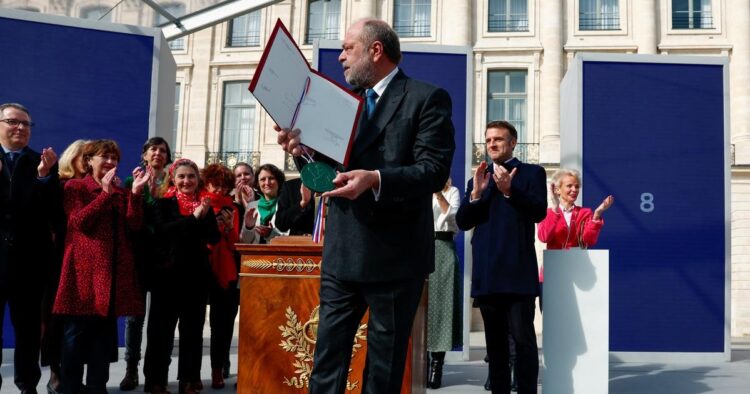In a historic move celebrated globally, France has officially enshrined the right to abortion in its constitution on March 8, marking International Women’s Day with a profound statement of support for women’s rights. The country’s Justice Minister, Eric Dupond-Moretti, utilized a 19th-century printing press to symbolically seal the amendment into France’s national charter during a special public ceremony held at the cobblestoned Place Vendome in Paris. The occasion was met with applause, as France became the first nation to explicitly guarantee abortion rights within its constitution.
The amendment, which received overwhelming approval from French lawmakers earlier in the week, was ratified during the ceremony, signaling its entry into force. This significant step highlights France’s stance on abortion, viewing it more as a matter of public health rather than a political battleground, a perspective starkly different from the divisive discourse often seen in the United States.
While the measure faced opposition from some quarters, including far-right lawmakers, it was widely supported and hailed by women’s rights advocates across the world. French President Emmanuel Macron linked the decision to a U.S. Supreme Court ruling in 2022, which rolled back longstanding abortion rights, emphasizing the global impact of such legal decisions.
However, critics of Macron questioned the necessity of the amendment in a country where abortion rights were relatively secure, urging attention to other pressing issues faced by women, such as healthcare accessibility and gender-based violence. Despite this criticism, the ceremony served as a symbolic victory for many French women, although some highlighted ongoing challenges in accessing abortion services.
The move by Macron’s government reflects a broader concern in Europe about the rise of hard-right groups and their potential impact on women’s rights. By embedding abortion rights into the constitution, France aims to safeguard against any potential threats to reproductive freedoms, mirroring concerns expressed in other European countries.
The constitutional amendment includes a specific provision affirming “the freedom of women to have recourse to an abortion, which is guaranteed,” marking a significant milestone in the country’s legal landscape. The ceremony itself, held outdoors with public participation, underscores the importance of transparency and inclusivity in constitutional matters.
France’s decision to incorporate abortion rights into its constitution follows a similar move by the former Yugoslavia in 1974, demonstrating a historical precedent for recognizing reproductive freedoms within national charters. While celebrations marked the occasion, protests also erupted in various countries, highlighting ongoing struggles for gender equality and women’s rights worldwide.
As the world commemorates International Women’s Day, France’s constitutional amendment serves as both a symbolic gesture and a tangible step towards advancing women’s rights on a global scale. Despite challenges that persist, the recognition of abortion rights within the constitution represents a significant victory for reproductive justice and gender equality.

















Comments